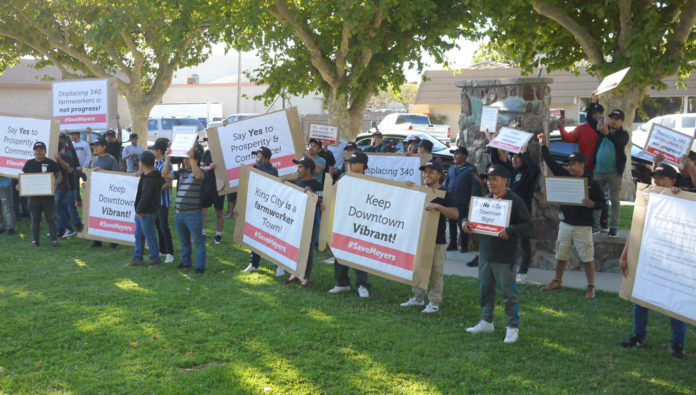
KING CITY — King City planning commissioners have delayed a final decision on the Meyers Farmworker Housing Facility until their Oct. 7 meeting.
The 4-0 vote came during the Planning Commission’s Aug. 19 meeting, where numerous community members, business owners and farmworkers spoke out on behalf of the facility and the seasonal workers housed there.
A large protest preceded the meeting, with more than 100 farmworkers and their supporters gathering before city hall with signs asking the commissioners to “#SaveMeyers.”
Located at 102 Broadway St. in King City, the Meyers facility provides housing for seasonal farmworkers, mostly from Mexico. It originally had 214 beds when it began operation in 2016, but added 150 beds in 2018 for a total of 364 beds.
The delay in decision came after presentations from city staff, stakeholders in SGH Holdings and their attorney, Krista Ostoich. Public comments repeated the need for farmworkers and the positive effect those workers have on the local economy.
Commissioner Teri Storelli made the motion for a delay, originally moving the decision to Sept. 16 before pushing it to October after Ostoich said she could not be present for the September meeting.
SGH Holdings is owned by Steve Scaroni, David Gill and Mike Hitchcock. Managing Partner Scaroni asked why the delay took place.
“So that we can review the information before us, the information we got tonight,” Storelli answered. “We received our packets just a few days ago. We want to do our due diligence to make sure we’re giving it the full attention it deserves.”
Storelli noted commissioners might have questions for staff and SGH in order to make an informed decision.

While Storelli and Scaroni both agreed the material under consideration came with too short a time for their preferences, commissioner Margarita Lopez asked about the timeline given to farmworkers.
“I’m asking him when he had notice he would no longer have a home,” Lopez said in English after asking Jose Garcia a question in Spanish.
Garcia, a farmworker who delivered public comments at the meeting, answered he found out 20 days earlier.
The original permit agreement was temporary and had a duration of five years with the option of five one-year extensions. The current expiration would be Sept. 26, 2026. An additional 10 years is being proposed, so that the new CUP would expire on Nov. 30, 2036.
Staff recommended denying the application to amend the conditions of approval to limit the Temporary CUP to 10 years, with such a decision meaning the housing facility would cease operation in 2026.
Development Director Doreen Liberto said the city had met with SGH and its representatives numerous times in recent years, provided applications and had yet to receive an application for a permanent permit.
Ostoich said the permit applications make no distinction between permanent and temporary application. In addition, she brought up disagreement with the city’s ordinance, which seemed to be a prerequisite to a permanent permit.
“It’s been a real problem talking to anybody … about what’s going on here,” Scaroni said. “We’ve been kind of in a black hole of communication with the city.”
Scaroni also raised objections to the ordinance he felt blocked the permit process.
“We believe the ordinance is not legal,” Scaroni said. “It goes way over what state and federal minimums are for farmworker housing.”









